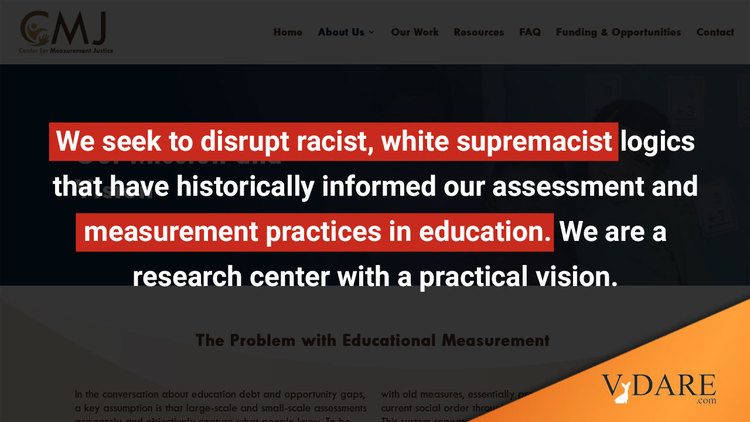
05/20/2022
From the website for the Center for Measurement Justice:
CENTER FOR MEASUREMENT JUSTICE
We seek to disrupt racist, white supremacist logics that have historically informed our assessment and measurement practices in education. We are a research center with a practical vision.OUR MISSION
We aim to bring antiracist assessment and measurement practices to all learners across the nation. Our work is to inspire, prepare, and support a critical mass of measurement professionals and partners as they work towards a socially just assessment and measurement system.In the conversation about education debt and opportunity gaps, a key assumption is that large-scale and small-scale assessments accurately and objectively capture what people know. To be sure, this is not true for all people, particularly in Black, Brown, and Indigenous (BBI) communities. The field of educational measurement is steeped in ways that center heteronormative white supremacy, from the assumption that assessment tasks can be culturally neutral (they cannot), to an oft-used technique in which new measures are deemed good if they correlate strongly with old measures, essentially proving their ability to uphold the current social order through a network of deficit-framed data. This system repeatedly and consistently fails to capture the true capacity of minoritized learners, especially BBI learners. While score differentials between racial groups are often explained away by deficit narratives about what BBI students know and are able to do, in fact, they partially reflect a failure of measurement.
Mission
CMJ seeks to inspire, prepare, and support a critical mass of measurement professionals and co-conspirators as they work towards a socially just assessment and measurement system. Through this work, we aim to become the epicenter for engagement on measurement justice, galvanizing communities, school systems, assessment creators, and researchers to advance socially just assessment and measurement approaches.In our work, we push back against assessment practices that do not value diverse types of knowledge and knowledge creation- especially with respect to Black, Brown, and Indigenous communities. We recognize that the complex and rich identities of all individuals should be acknowledged, valued, and sustained by/through our assessment practices. Moreover, we acknowledge the white supremacist, racist roots of measurement and seek to disrupt this historical narrative through culturally sustaining assessment practices that are explicitly and unapologetically antiracist. And so, as advocates for justice, we lean into difficult assessment and measurement challenges by building awareness, seeking creative solutions, and generating transformative ideas in an effort to provide and/or create measurement justice for all.
Good luck… It’s not as if anybody in the last 58 years since Congress voted a million dollars for the Coleman Report in the 1964 Civil Rights Act to prove that the reason blacks score lower on tests is discrimination ever thought to come up with tests that are both valid and don’t have disparate impact. I guess social scientists have been leaving a billion dollar bill lying on the sidewalk ever since.
This is a content archive of VDARE.com, which Letitia James forced off of the Internet using lawfare.